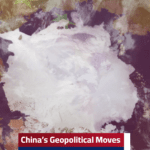The U.S. Department of Defense has designated China COSCO Shipping Corporation, the world’s largest shipping company, as a “Chinese military company,” alleging ties to China’s People’s Liberation Army.
This designation, while not accompanied by specific sanctions, aims to discourage U.S. firms from engaging with the listed entities. As a result, COSCO’s shares experienced a decline of up to 4.4% in Hong Kong following the announcement.
In response, COSCO stated that the subsidiaries identified by the Pentagon are not military companies and that the designation does not place them on any sanctions or export control lists. The company emphasized that this classification will not impact its business operations and is actively communicating with relevant U.S. parties to clarify the situation.
Analysts suggest that the immediate impact on COSCO’s operations may be limited. Lars Jensen, a container industry expert, noted that the designation itself does not impose penalties beyond restricting the U.S. military from contracting with COSCO. However, there is potential for “self-sanctioning” by market participants concerned about U.S. policies.
This development is part of broader U.S. efforts to address China’s “military-civil fusion strategy,” which seeks to leverage civilian industries for military modernization. Other Chinese entities, including China State Shipbuilding Corporation (CSSC) and China National Offshore Oil Corporation (CNOOC), have also been designated under similar allegations.
How Can the U.S.-China Economic Rivalry Escalate with Trump Returning to Office?
The blacklisting of China COSCO Shipping Corporation by the U.S. Department of Defense highlights the intensifying economic and strategic rivalry between the United States and China, reflecting broader concerns about Beijing’s military-civil fusion strategy. This move aligns with Washington’s ongoing efforts to curb China’s influence in critical industries, raising fears of further decoupling between the two economic superpowers.
It can be anticipated that with President Donald Trump’s return to office, his “America First” policy and combative approach to trade relations—exemplified by the tariffs and sanctions imposed during his previous tenure—could exacerbate tensions. Trump’s administration had prioritized reshoring supply chains and reducing reliance on Chinese imports, and similar policies could revive fears of a renewed trade war, amplifying disruptions in global markets and supply chains. This development signals potential long-term challenges for global trade stability, particularly if economic competition evolves into broader geopolitical confrontation.














